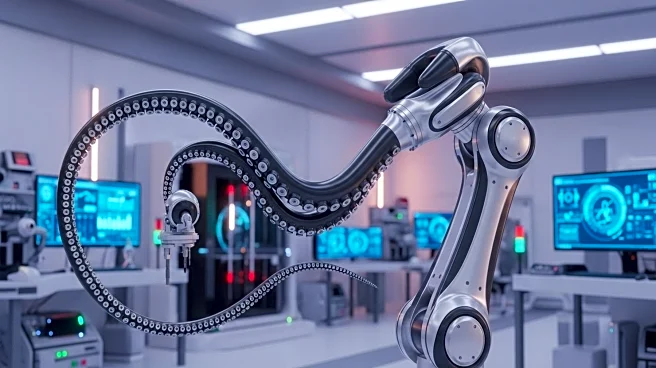What is the story about?
What's Happening?
Researchers from the Marine Biological Laboratory and Florida Atlantic University have conducted a comprehensive study on octopus arm movements in natural habitats. The study involved recording 25 wild octopuses across various locations, capturing thousands of arm movements related to behaviors such as foraging, locomotion, and defense. Octopus arms are known for their flexibility and control, with each arm capable of bending, twisting, elongating, and shortening with precision. This research aims to inspire the design of flexible robotic arms that could be used in lifesaving missions, such as navigating disaster zones to deliver aid. The study highlights the octopus's intelligence, with two-thirds of its neurons located in its arms, allowing each arm to sense, move, and make decisions independently while communicating with the central brain.
Why It's Important?
The study of octopus arm movements has significant implications for the field of robotics, particularly in the development of soft, adaptable robotic arms. These arms could be used in various applications, including search and rescue operations, where they can navigate through rubble to deliver food or medicine to trapped individuals. The research also contributes to a deeper understanding of octopus biology, offering insights into their complex behaviors and intelligence. By studying these natural movements, scientists can develop technologies that mimic the octopus's flexibility and problem-solving abilities, potentially leading to advancements in neuroscience, animal behavior, and robotics.
What's Next?
The findings from this study are expected to guide future research in robotics, with engineers seeking to design robotic arms that replicate the octopus's ability to perform precise and exploratory tasks. The study's publication in Scientific Reports may lead to further collaborations between biologists and engineers, exploring new avenues in soft robotics inspired by octopus behavior. Additionally, the research may influence the development of technologies that can adapt to changing environments, emphasizing the importance of flexibility and innovation in both natural and technological contexts.
Beyond the Headlines
The study of octopus arms not only impacts robotics but also highlights broader principles of adaptability and innovation in nature. Octopuses demonstrate how survival depends on the ability to change and solve problems, a lesson applicable to ecosystems, human health, and future technologies. Their ability to use tools, camouflage, and learn from other animals showcases the complexity of their behavior, offering valuable insights into the evolution of intelligence and adaptability in the animal kingdom.














